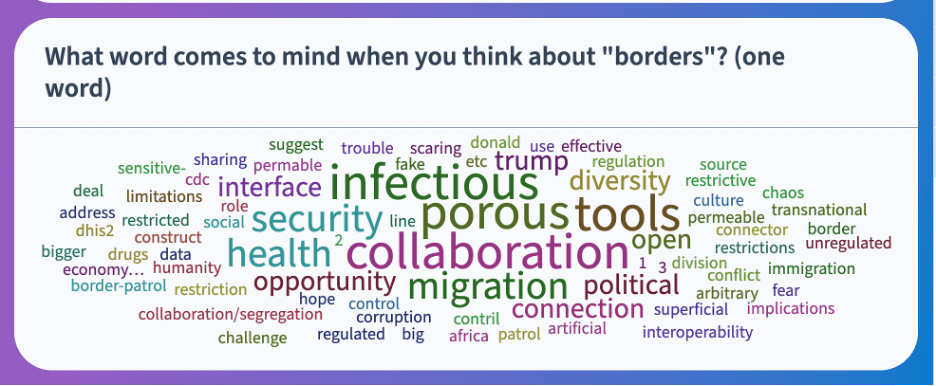On March 10, 2024, the global health security team at UCSF’s Center for Pandemic Preparedness and Response (CPPR) participated in a panel discussion titled “The Importance of Cross-border Surveillance in Pandemic Prevention: Examples from Three Continents” at the Consortium of Universities for Global Health (CUGH) 15th Annual Conference in Los Angeles.
CUGH is a network of over 190 academic institutions and organizations worldwide dedicated to addressing global health issues. Their main mission is to empower academic entities and collaborative partners to improve the well-being of individuals and the planet through education, research, service and advocacy. This year’s conference featured 57 speaker sessions and plenaries and hosted over 2,000 attendees, including scientists, students, implementers and professionals from academia, NGOs, government and the private sector, reflecting a diverse and widespread participation from around the world.

The panel discussion focused on global health security, particularly in the Middle East North Africa (MENA) region, East Africa, and the southern U.S. border. The conversation explored the complexities of cross-border public health surveillance, highlighting the urgent need for seamless data integration and information sharing among nations, as well as the development of unified policies to strengthen global health security.
Laura Buback, MPH, led the panel and provided a comprehensive overview of the importance of cross-border surveillance. Farah Massoud, MPH, Francis Kakooza, PhD, and Ietza Bojorquez, MD, MPH, PhD, offered insights into the MENA region, Uganda, and the U.S.-Mexico/Mexico-Guatemala borders, respectively. Their discussion was skillfully moderated by Solange Madriz, MA, MS, who ensured that everyone had the opportunity to share their ideas and perspectives.
Throughout the session, several key takeaways emerged. In the MENA region, it became evident that cross-border surveillance is essential for effectively monitoring and managing the health of mobile populations, considering the complex geopolitical and humanitarian challenges. Enhanced collaborative partnerships, information-sharing mechanisms, and technological innovations were identified as critical components for addressing the unique health needs of mobile populations and mitigating the risks of infectious disease transmission.
Similarly in East Africa, the importance of decentralizing International Health Regulations (IHR) assessments to the sub-national level was emphasized. The establishment of regional emergency operations centers and the utilization of electronic Integrated Disease Surveillance (IDS) and reporting systems were highlighted as essential strategies for enhancing border health surveillance and detecting community threats.
On the southern U.S. border, it was emphasized that cross-border surveillance represents a form of binational collaboration that should be supported and strengthened, as it offers a more effective approach to addressing public health threats compared to border closures. Trust between local actors was identified as a cornerstone of this collaboration, underscoring the importance of continuous support from national/federal, regional/state and local levels of government. Additionally, the significance of recognizing and fostering local- and state-level collaboration in cross-border surveillance efforts was acknowledged.
This plenary discussion was the final event of the conference and attracted significant attendance. To encourage interaction, attendees were invited to participate in quiz questions and contribute to word clouds via Poll Everywhere. The resulting word cloud, which vividly illustrated the enthusiasm and engagement of the audience, reflected participant responses to the prompt “What words come to mind when you think about ‘borders’?” “Collaboration” emerged as the most prominent word, highlighting the importance of partnerships, networks and trust. The panel concluded by urging university partners to consider ways in which they can engage in this emerging topic, including generating evidence, sharing lessons across countries, and developing their workforce.
Watch the recording on the CUGH website.


